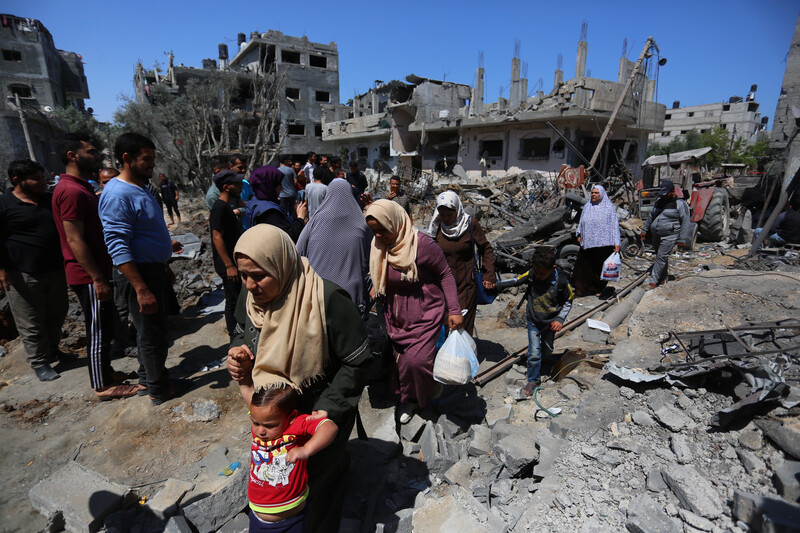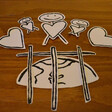The Electronic Intifada 17 May 2021

Israel carried out a massive bombardment of Beit Hanoun in Gaza late at night.
APA imagesThe morning of Eid al-Fitr began with the sounds of children.
They were performing Eid takbirat – the chant of Allahu akbar or “God is great” – through loudspeakers in Gaza’s mosques.
Their voices were unusually quiet. It was so different from the energetic chorus we would generally expect to hear at Eid.
Yet for a brief moment, the chants were enough to make us forget the horrors of Israel’s attack.
In Gaza, we tend to prepare for Eid with obsessive waves of cleaning.
We also make kaak (biscuits), maamoul (date-filled cookies) and sumaghiya – a beef and chickpea stew.
With all that housework, the last day of Ramadan can be quite tough.
The last day of Ramadan was tough this year but for different reasons.
Israel was bombarding us once again. The news was horrifying.
Angry
We could barely sleep that night.
My mother became very angry.
After a day of cleaning and preparing food, she went out to our backyard. Everything was covered in dust from Israel’s blasts.
Pieces of debris were scattered all around.
All her mopping had been wasted.
Just before Eid, I gave a lecture on English Romantic poetry. During it, I read William Wordsworth’s My Heart Leaps Up.
My students discussed how Wordsworth appreciated the little things in life, how moments of joy can bring lasting happiness.
As usual, my students began to write their responses to the poem.
As the bombing during the week became more intense, I checked on my students via our Facebook group. I told them that the deadline for submitting their responses had been extended.
They could wait until the end of Israel’s attack before doing so – assuming that we would make it through the attack alive.
Yet one of my students, Osama, had already completed his response.
For Osama, the rainbow that Wordsworth beholds in his poem had been transformed into the missiles fired by Israel.
Osama’s heart still leapt up as he saw these missiles and heard Israel’s explosions. But it leapt up with fear, sadness and anticipation rather than joy.
Wordsworth wrote:
My heart leaps up when I behold
A rainbow in the sky
So was it when my life began
So is it now I am a man
So be it when I shall grow old
Or let me die!
Osama’s final observation – in his response to the poem – read: “Palestinian children grow old so fast, witnessing Israeli bombardment from birth to death.”
Trauma overflows
Khaled, another student who is himself a gifted poet, wrote a similarly grim response. He set the poem in the context of the preparations for Eid and the “cold mood” that prevailed.
“When you read poetry about rainbows and daffodils, you are supposed to feel calm and peaceful,” Khaled wrote. “But how can that happen when there is carnage across the city?”
We talked about how Wordsworth would store moments in his memory. The moments would return to him while he relaxed on a couch “in vacant or in pensive mood,” his best known poem I Wandered Lonely as a Cloud suggests.
For the Romantics, poetry was about the spontaneous overflow of powerful feelings. These feelings were recalled amid a sense of tranquility.
In Gaza, the only thing that overflows is trauma.
Everyone in our home reacts nervously when my mother closes a door – or when we hear a neighbor opening his garage door. Any sound now disturbs us.
The latest attack transports us back to the horror of the three other major attacks inflicted on us since December 2008.
Israel gave those attacks codenames: Operation Cast Lead, Operation Pillar of Defense and Operation Protective Edge.
The codenames do not capture the terror we have endured.
Another student, Abubaker, told us about how he already had a close call during the current Israeli attack.
On the second day of the attack, Israel bombed al-Salah school in the Deir al-Balah area of central Gaza. Abubaker lives just 100 meters from that school.
“My heart told me that it was time to say goodbye,” Abubaker wrote in his response to My Heart Leaps Up
I am not sure that the Romantics expected their poetry to be discussed in this context.
Romanticism is often characterized as an era when art – poetry, especially – moved its focus from the cosmic, the religious, the divine and the epic to the ordinary, the everyday, the relatable. But when the ordinary becomes catastrophic, barbaric, unimaginable, perhaps there would be nothing left for the Romantics.
After three days, I stopped following the news. I had been anxious the entire time, feeling sick when I heard every explosion.
I was always hearing about the deaths of friends and the obliteration of whole buildings.
I had work to do.
Israel’s bombs meant that the Eid celebrations were canceled. Or, to be more precise, Israel canceled them for us.
On the day after Eid, the other members of my family managed to get some sleep.
I stayed awake. One of us had to remain alert in case the family needed to be woken up – if Israel was bombing us or another home in our neighborhood.
Woken at midnight
Just as she had done during the previous Israeli attacks, my mother put our essential documents in a bag. She placed it next to the front door so that we could take it quickly if we had to evacuate our house.
This is a ritual known all-too-well to everyone in Gaza.
It turned out that I did not need to wake up my family.
At midnight, Israel decided to wake up the entire Gaza Strip with a massive bombardment.
We gathered in the living room and started trying to figure out what was going on. We flicked through every news channel on the TV but could not tell what was happening.
We did not dare go outside the house. Nobody else in the neighborhood did.
It felt like the bombs were falling all around us.
We learned from the news that Israel was attacking the town of Beit Hanoun, just a few miles from our home.
My father immediately called my aunt – his sister.
She lives in Shujaiya, an area in Gaza City that is very close to Beit Hanoun.
My aunt was already on the street with her family and neighbors. They had left their homes and were heading west on foot.
Immediately, memories of the 2014 attack on Gaza came flooding back.
I thought, too, about the expulsions that occurred during the Nakba, the 1948 ethnic cleansing of Palestine.
And I imagined what could happen to Palestinians in the Sheikh Jarrah area of Jerusalem if the Israelis have their way.
As Israel continued to bomb Gaza, my father and one of my uncles drove toward Shujaiya. They hoped to bring my aunt’s family back with them and that her family would be safer with us.
Our hearts pounded during their absence. To our relief, my dad and my uncle returned after an hour and a half, with my relatives from Shujaiya in tow.
The bombing eased off a little.
For a while, we broke our rule that somebody should stay awake during Israel’s attacks and watch over everyone else. We were so exhausted that we all fell asleep.
Ahmed Nehad is a translator and teaching assistant from Gaza. Twitter: @AhmedNehadKh




